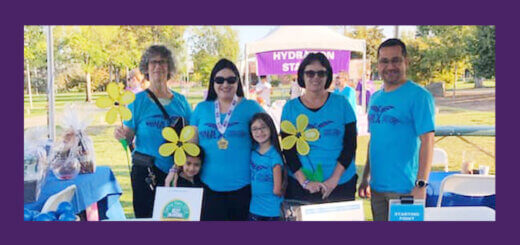Alzheimer’s in the news: moving concern for the cause
Hopefully you’ve seen expanded coverage of our issues in the media lately. The Shriver Report: A Woman’s Nation Takes on Alzheimer’s was created by the Alzheimer’s Association in collaboration with California’s First Lady. It speaks to the disproportionate impact of Alzheimer’s on women, both as the afflicted and as caregivers. If I do say so myself, it’s very well done and includes stories from local Northern California families. Visit www.alz.org to obtain your own copy. Then there is the Time magazine of October 25, a sober but ultimately hopeful review of the current state of Alzheimer’s care and science.
Dr. Ron Peterson of the Mayo Clinic serves as Chair of our National Medical and Scientific Advisory Committee and I love his quote, “We spend $5.6 billion a year funding cancer studies, $1 billion a year for heart disease”¦ and $500 million a year to study Alzheimer’s. Yet what is going to get most of us in the next few years is Alzheimer’s.”
Death rates from Cancer, Heart Disease, Stroke and HIV are falling and deaths from Alzheimer’s are climbing at a rapid rate. The take away for me is that a major societal investment has worked. Clearly we have a long way to go in all of these issues, but we’ve been at cancer and heart research far longer than Alzheimer’s and the investment in research has paid off in marginal but important ways.
The New York Times also published a series of articles on Alzheimer’s, the most recent about financial risk for people with early Alzheimer’s. The piece focused on people whose financial security was compromised by people who took advantage of their early cognitive deficits. Unfortunately, I have known stories like this locally”¦ people who were taken advantage of by bus drivers, bankers, long term care providers and would-be partners. These are challenging cases for families and prosecutors because the person with early dementia will have a degree of competence from day to day and sometimes families are loathe to let their loved one know what mistakes they may have made. I remember a daughter whose father had been fleeced by a charming young professional and who couldn’t share the facts with her dad, “It would kill him to know his savings were gone.”
All of this coverage – varying stories, telling different aspects of our issue – are good for moving concern for our cause.
Maria Shriver joined our California advocates for a conversation about the soon to be presented California State Plan for Alzheimer’s Disease. We had a lively discussion about using the term “dementia” vs. “Alzheimer’s.” We are the Alzheimer’s Disease and Related Disorders Association and we often spend time worrying about whether we fully embrace the related disorders – vascular dementia, frontal temporal dementia, Lewy body dementia, etc. Ms Shriver was clear”¦ we’ve got to say “Alzheimer’s” and say it again and again, otherwise, we lose our public and we lose public attention and we lose the limited focus of our policy makers.

















